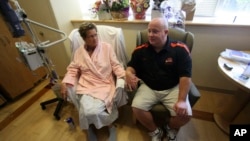Being married reduces mortality after heart surgery, according to a new study.
Writing in the journal JAMA Surgery, researchers at the Perelman School of Medicine at the University of Pennsylvania found that patients who are divorced, separated or widowed had around a 40 percent higher risk of dying or “developing a new functional disability” within the first two years after heart surgery than patients who were married.
“While it has been established that the chances of survival following major surgery may be better among married versus unmarried persons, it is not known how marriage ‘marries’ with actual postoperative function,” said study co-author Doctor Mark Neuman.
“Understanding this may be useful for identifying patients who may be in need of additional support and targeted interventions aimed at improving functional recovery.”
Analyzing survivors
The researchers analyzed data from more than 1,500 heart surgery survivors and found 65 percent were married, 12 percent were divorced or separated, 21 percent were widowed and two percent were never married.
They found that years later, 19 percent of married subjects, 29 percent of the divorced or separated subjects, 39 percent of the widowed subjects and 20 percent of those who’d never been married had died or become disabled in some way that interfered with basic daily functioning.
The study furthers previous research that social support systems such as a spouse reduce mortality, but the researchers caution that further study is needed to “understand and define the mechanisms that link marital status and postoperative outcomes.”
That view was echoed by researchers not involved in the study.
Dr. Ashish Shah, head of heart transplantation at Vanderbilt University Medical Center told ABC News that patients with someone to support them do better than other patients. The key, Shah said was trying to find out how unmarried or widowed patients can get the same kind of support from somewhere else.
"There has always been the feeling that people who have [a person] that is supporting them tend to do better," Shah told ABC News. "Most heart surgeons would agree that emotional stresses will complicate operations."





